This Week in Freethought History (July 7-13)
Here’s your week in Freethought History. This is more than just a calendar of events or mini-biographies – it’s a reminder that, no matter how isolated and alone we may feel at times, we as freethinkers are neither unique nor alone in the world.
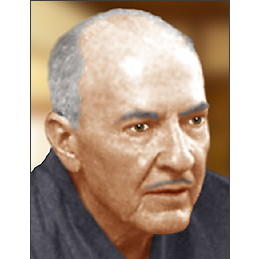 Last Sunday, July 7, but in 1907, American science fiction writer Robert A. Heinlein was born. His novels are full of skeptical, if not cynical, references to religion. His 1961 Stranger in a Strange Land is described as “an amazingly iconoclastic and complex satire of sex and religion.” The title character is a Christ-like figure and communion is compared to ritual cannibalism. Heinlein’s novels contain such aphorisms as: “Men rarely (if ever) dream up a God superior to themselves. Most gods have the manners and morals of a spoiled child” and “Religion is a crutch for people not strong enough to stand up to the unknown without help.” Writing as himself, rather than as his alter-ego Lazarus Long, Heinlein said, “It is a truism that almost any sect, cult, or religion will legislate its creed into law if it acquires the political power to do so, and will follow it by suppressing opposition, subverting all education to seize early the minds of the young, and by killing, locking up, or driving underground all heretics.”
Last Sunday, July 7, but in 1907, American science fiction writer Robert A. Heinlein was born. His novels are full of skeptical, if not cynical, references to religion. His 1961 Stranger in a Strange Land is described as “an amazingly iconoclastic and complex satire of sex and religion.” The title character is a Christ-like figure and communion is compared to ritual cannibalism. Heinlein’s novels contain such aphorisms as: “Men rarely (if ever) dream up a God superior to themselves. Most gods have the manners and morals of a spoiled child” and “Religion is a crutch for people not strong enough to stand up to the unknown without help.” Writing as himself, rather than as his alter-ego Lazarus Long, Heinlein said, “It is a truism that almost any sect, cult, or religion will legislate its creed into law if it acquires the political power to do so, and will follow it by suppressing opposition, subverting all education to seize early the minds of the young, and by killing, locking up, or driving underground all heretics.”
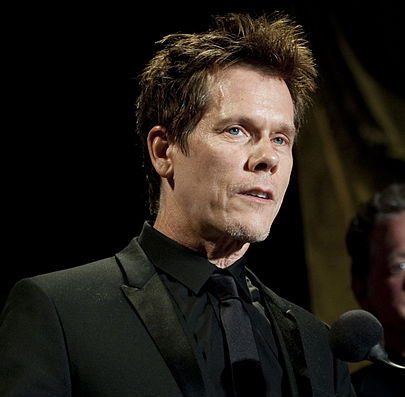 Last Monday, July 8, but in 1958, American film and stage actor Kevin Bacon was born. Born Kevin Norwood Bacon and reared in in Philadelphia, Pennsylvania, at 17 he left for New York City to become an actor. After some struggle, he landed a noteworthy role in Diner (1982), then two years later his breakthrough role as a rebellious teenager in Footloose (1984). This was followed by Tremors (1990), A Few Good Men (1992), The River Wild (1994), Apollo 13 (1995), Murder In the First (1995), Stir of Echoes (1999), Hollow Man (2000), Mystic River (2003), The Woodsman (2004) and Taking Chance (2009), among others.
Last Monday, July 8, but in 1958, American film and stage actor Kevin Bacon was born. Born Kevin Norwood Bacon and reared in in Philadelphia, Pennsylvania, at 17 he left for New York City to become an actor. After some struggle, he landed a noteworthy role in Diner (1982), then two years later his breakthrough role as a rebellious teenager in Footloose (1984). This was followed by Tremors (1990), A Few Good Men (1992), The River Wild (1994), Apollo 13 (1995), Murder In the First (1995), Stir of Echoes (1999), Hollow Man (2000), Mystic River (2003), The Woodsman (2004) and Taking Chance (2009), among others.
Bacon and his wife Kyra Sedgwick appeared in a video promoting the “Bill of Reproductive Rights,” supporting among other things a woman’s right to choose and access to birth control. An outspoken proponent of church-state separation, Bacon told The Times of London (12/1/2005), “I think there is a puritanical wind that is blowing. I have never seen such a lack of separation between church and state in America. I don’t believe in God, but if I did I would say that sex is a God-given right. Otherwise it’s the end of our species.”* Bacon also performs as a musician with his with his older brother Michael Bacon as the Bacon Brothers. In a 2008 Fox News interview before one of their performances, Kevin Bacon was asked about his views on church-state separation: “I think that one of the great things about this country is that people of all the religions can come and practice and worship in a way that makes them happy and gives them a peace. And another great thing about it is that our government is not supposed to be based or tied to religious organizations.” In one of the songs co-written by the Bacon Brothers, the refrain goes,
But please don’t hurt the children, please lay down the rod
Please don’t send your bombs in and say you’re doing the work of God
Faith is not a weapon. Hate won’t set us free
You believe what you believe and that’s OK with me
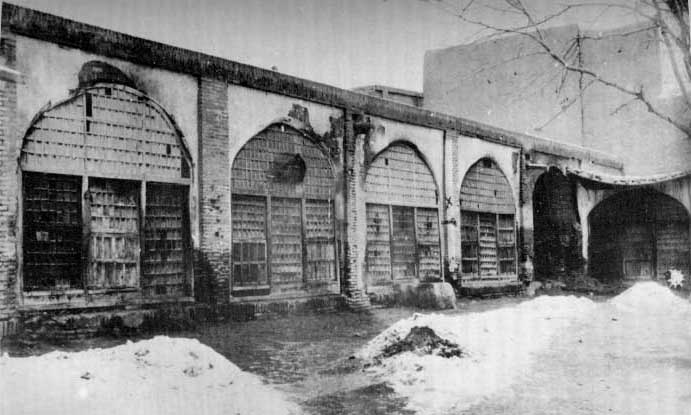 Last Tuesday, July 9, but in 1850, 30-year-old Persian religious reformer and central figure in the Bahá'í faith, known as The Báb (Arabic: باب), “the Gate” (of God), was executed by firing squad in Tabriz, Persia, which is now Iran. The life of The Báb (born Siyyid `Alí Muḥammad Shírází; Persian: سيد علی محمد شیرازی) gives us an interesting illustration of how miracles and legends can attach themselves to recent historical figures, much as details of the life of Jesus multiplied after his contemporaries died. In both cases, the myth-making began shortly after the preacher died. The Báb’s biography was published three years later with a straightforward narrative. But within twenty years his biography included myths and miracles, such as this one:
Last Tuesday, July 9, but in 1850, 30-year-old Persian religious reformer and central figure in the Bahá'í faith, known as The Báb (Arabic: باب), “the Gate” (of God), was executed by firing squad in Tabriz, Persia, which is now Iran. The life of The Báb (born Siyyid `Alí Muḥammad Shírází; Persian: سيد علی محمد شیرازی) gives us an interesting illustration of how miracles and legends can attach themselves to recent historical figures, much as details of the life of Jesus multiplied after his contemporaries died. In both cases, the myth-making began shortly after the preacher died. The Báb’s biography was published three years later with a straightforward narrative. But within twenty years his biography included myths and miracles, such as this one:
[The head prison attendant] found The Báb speaking privately with Siyyid Husayn, who acted as His secretary. [He] pulled Siyyid Husayn aside and reprimanded him. Hearing this, The Báb warned, “Not until I have said to him all those things that I wish to say can any earthly power silence Me.”
… [T]he Báb and Muhammad-’Alí were brought into the courtyard… A regiment of seven hundred fifty soldiers… formed the firing squad. … About ten thousand spectators lined the rooftops of the barracks and adjoining houses as the [soldiers fired]. The smoke from the guns was so thick it momentarily darkened the sky and obscured the view of the condemned.
When the smoke cleared, the crowd was stunned to find the Báb gone and Muhammad-’Alí standing unscathed on the ground! … A frenzied search was mounted to locate the Báb. When they found Him, He was seated in the room He had occupied the night before, finishing His interrupted conversation with Siyyid Husayn.
Bahá’í seems to embrace many liberal principles: the elimination of racial and ethnic prejudice, leveling extremes of wealth and poverty, promoting the equality of women, universal education and world peace. But, as many of the pages from this Freethought Almanac have shown, these ends can be achieved without reliance on prayer or gods or superstitious beliefs. In fact, the Báb might have lived longer had he worked for these causes without committing to religion!
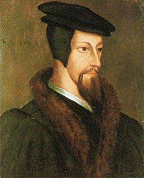 Last Wednesday, July 10, but in 1509, religious reformer John Calvin was born. Unlike his contemporary, Martin Luther, born 26 years earlier, Calvin was genteel and scholarly and was never ordained in the Catholic Church. Persuaded to come to Geneva to preach, it was there that Calvin came into his own. He drew up his five points – total depravity, unconditional election, limited atonement, irresistible grace, and the perseverance of the saints – and to this doctrine he compelled all Genevans to swear belief. In 1538, tired of his tyranny, Calvin was exiled. But just three years later, Geneva begged him back. His power now nearly absolute, he wielded it with godly gusto. Within five years, Calvin exiled 76 and passed 58 death sentences – including luring Michael Servetus to his death by fire. As Robert Ingersoll described him, “Calvin was … a strange compound of revengeful morality, malicious forgiveness, ferocious charity, egotistic humility, and a kind of hellish justice. In other words, he was as nearly like the God of the Old Testament as his health permitted.”
Last Wednesday, July 10, but in 1509, religious reformer John Calvin was born. Unlike his contemporary, Martin Luther, born 26 years earlier, Calvin was genteel and scholarly and was never ordained in the Catholic Church. Persuaded to come to Geneva to preach, it was there that Calvin came into his own. He drew up his five points – total depravity, unconditional election, limited atonement, irresistible grace, and the perseverance of the saints – and to this doctrine he compelled all Genevans to swear belief. In 1538, tired of his tyranny, Calvin was exiled. But just three years later, Geneva begged him back. His power now nearly absolute, he wielded it with godly gusto. Within five years, Calvin exiled 76 and passed 58 death sentences – including luring Michael Servetus to his death by fire. As Robert Ingersoll described him, “Calvin was … a strange compound of revengeful morality, malicious forgiveness, ferocious charity, egotistic humility, and a kind of hellish justice. In other words, he was as nearly like the God of the Old Testament as his health permitted.”
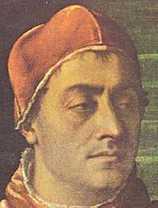 Last Thursday, July 11, but in 1533, Pope Clement VII (pope from 1523-1534) excommunicated England’s King Henry VIII (king from 1509-1547). By the time of Henry the sharp instrument of cutting off a member of the church from communing with his co-religionists had lost some of its edge. Of course, any group has the right to expel a member, but the Catholic doctrine then leaves no recourse for avoiding eternal damnation. Excommunication was first exercised in Apostolic times to punish heresy. In the Middle Ages, the Papacy abused it freely and frequently for political advantage – so much so that a bishop would excommunicate a thief who stole his property. The Christian fatwa is rarely used in these skeptical times because the action would serve to publicize rather than to preclude dissent and only in the most conservative communities would anyone take the sentence seriously. In the case of King Henry, he ignored the Pope and invented his own religion – a serious loss for Roman Catholicism.
Last Thursday, July 11, but in 1533, Pope Clement VII (pope from 1523-1534) excommunicated England’s King Henry VIII (king from 1509-1547). By the time of Henry the sharp instrument of cutting off a member of the church from communing with his co-religionists had lost some of its edge. Of course, any group has the right to expel a member, but the Catholic doctrine then leaves no recourse for avoiding eternal damnation. Excommunication was first exercised in Apostolic times to punish heresy. In the Middle Ages, the Papacy abused it freely and frequently for political advantage – so much so that a bishop would excommunicate a thief who stole his property. The Christian fatwa is rarely used in these skeptical times because the action would serve to publicize rather than to preclude dissent and only in the most conservative communities would anyone take the sentence seriously. In the case of King Henry, he ignored the Pope and invented his own religion – a serious loss for Roman Catholicism.
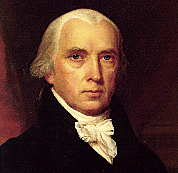 Yesterday, July 12, but in 1995, President Bill Clinton, in a talk to students at James Madison High School in Vienna, VA, advocated school-prayer guidelines. He said in part, “nothing in the First Amendment converts our public schools to religion-free zones or requires all religious expression to be left at the schoolhouse door.” In response, that August, the Department of Education issued a memo to public school superintendents concerning religious freedom. The Department advised that students cannot engage in religiously motivated harassment; that no student can be coerced into participating in any religious activity; that teachers and administrators cannot discourage or promote religious, or anti-religious, activity; that schools can teach about religion, but may not provide religious instruction; and that schools can teach about common civic values, but they must be neutral with respect to religion. Not satisfied with neutrality, three months later (November 1995) Republican Oklahoma Congressman Ernest Istook, supported by the Christian Coalition and others, introduced a Constitutional amendment allowing state-sponsored prayer in public schools. Istook’s attack on the First Amendment died on 4 June 1998. It is interesting to note the belief of the namesake of the high school where the policy was announced: “Congress should not establish a religion and enforce the legal observation of it by law,” wrote Madison in his 1789 Annals of Congress, “nor compel men to worship God in any manner contrary to their conscience.”
Yesterday, July 12, but in 1995, President Bill Clinton, in a talk to students at James Madison High School in Vienna, VA, advocated school-prayer guidelines. He said in part, “nothing in the First Amendment converts our public schools to religion-free zones or requires all religious expression to be left at the schoolhouse door.” In response, that August, the Department of Education issued a memo to public school superintendents concerning religious freedom. The Department advised that students cannot engage in religiously motivated harassment; that no student can be coerced into participating in any religious activity; that teachers and administrators cannot discourage or promote religious, or anti-religious, activity; that schools can teach about religion, but may not provide religious instruction; and that schools can teach about common civic values, but they must be neutral with respect to religion. Not satisfied with neutrality, three months later (November 1995) Republican Oklahoma Congressman Ernest Istook, supported by the Christian Coalition and others, introduced a Constitutional amendment allowing state-sponsored prayer in public schools. Istook’s attack on the First Amendment died on 4 June 1998. It is interesting to note the belief of the namesake of the high school where the policy was announced: “Congress should not establish a religion and enforce the legal observation of it by law,” wrote Madison in his 1789 Annals of Congress, “nor compel men to worship God in any manner contrary to their conscience.”
 Today, July 13, but in 1917, the third secret of Fátima was revealed – by the Virgin Mary to a 10-year-old named Lucia dos Santos and two other Portuguese peasant children. Lucia didn’t write down the third secret until 1944. By then, she had become a Carmelite nun and the two other witnesses – Jacinta and Francisco Marto – had died and could not corroborate her recollection. The First Secret was a vision of Hell, referring to the end of World War One and the beginning of World War Two. But somehow Mary got the name of the pope wrong and Lucia didn’t circulate this “prophecy” until 1940 – after World War Two had already started. The Second Secret predicted that Russia, recently turned Communist, would return to Christianity. So far Mary has this one wrong, too. Sister Lucia sealed and delivered the Third Secret to Pius XII in a letter. She claimed the Blessed Virgin had instructed her not to reveal it until 1960. But, in 1960, John XXIII refused to reveal the secret. So did his successor, Paul VI. It fell to John Paul II: In 27 June 2000 news reports, the veil was lifted and the prophecy was… anticlimactic. It was not about the end of the world. In part, it said:
Today, July 13, but in 1917, the third secret of Fátima was revealed – by the Virgin Mary to a 10-year-old named Lucia dos Santos and two other Portuguese peasant children. Lucia didn’t write down the third secret until 1944. By then, she had become a Carmelite nun and the two other witnesses – Jacinta and Francisco Marto – had died and could not corroborate her recollection. The First Secret was a vision of Hell, referring to the end of World War One and the beginning of World War Two. But somehow Mary got the name of the pope wrong and Lucia didn’t circulate this “prophecy” until 1940 – after World War Two had already started. The Second Secret predicted that Russia, recently turned Communist, would return to Christianity. So far Mary has this one wrong, too. Sister Lucia sealed and delivered the Third Secret to Pius XII in a letter. She claimed the Blessed Virgin had instructed her not to reveal it until 1960. But, in 1960, John XXIII refused to reveal the secret. So did his successor, Paul VI. It fell to John Paul II: In 27 June 2000 news reports, the veil was lifted and the prophecy was… anticlimactic. It was not about the end of the world. In part, it said:
…the Holy Father passed through a big city half in ruins and half trembling with halting step, afflicted with pain and sorrow, he prayed for the souls of the corpses he met on his way; having reached the top of the mountain, on his knees at the foot of the big Cross he was killed by a group of soldiers who fired bullets and arrows at him…
Was this a “prediction” of the 1981 assassination attempt on John Paul II? It must be remembered that the gunman failed to kill the pope. The Third Secret of Fátima appears to be, like the first two, a pious fraud.
Other birthdays and events this week—
July 8: The American Psychological Association was organized (1892): Religion v. Psychology.
July 11: Sixth American President John Quincy Adams was born (1767).
July 12: American poet and essayist Henry David Thoreau was born (1817).
July 12: German-Jewish philosopher and journalist Günther Anders was born (1902).
July 12: Canadian physician William Osler was born (1849).
We can look back, but the Golden Age of Freethought is now. You can find full versions of these pages in Freethought history at the links in the American Heathen blog, which take you to my blog, FreethoughtAlmanac.com.

